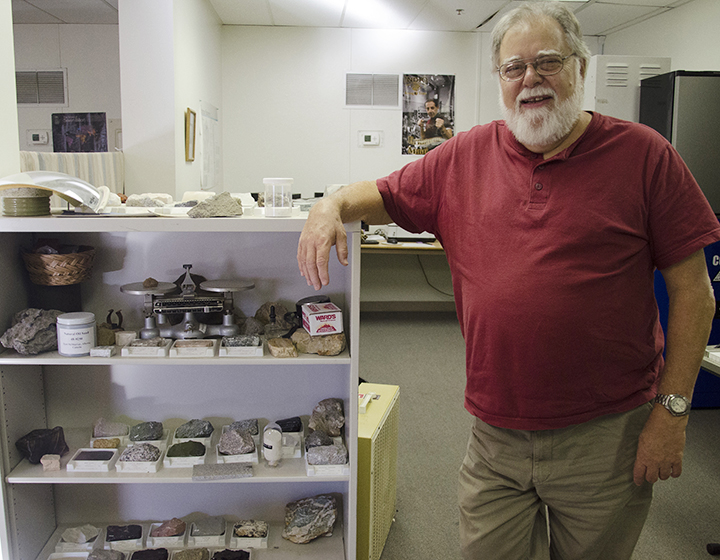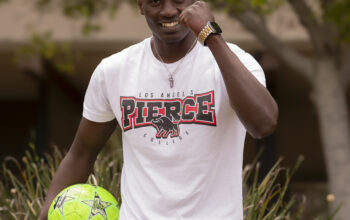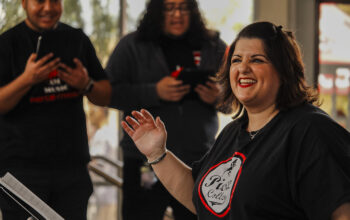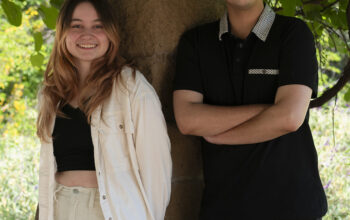
Outside of the classroom, the Pierce College village is rather quiet as the sun begins to set on an unseasonably hot day. However, the heat is kept at bay within the room’s walls thanks to the air conditioner and its monotonous buzz.
While the sounds of swift penmanship and clicking keys permeate through the ushered voice that fills the entire bungalow.
The previously mentioned voice belongs to 68-year-old professor of Geology Craig Meyer, who has been lecturing students in environmental studies at Pierce since 1973.
He currently teaches Environmental Science I and II, Environmental Geology, and Fundamentals of Water Treatment.
Meyer is the advisor for the entire environmental sciences program at Pierce, and over the years he has developed a unique teaching style that has guided his students both in and out of the classroom.
Although he was born in Chicago, Meyer doesn’t have much allegiance to the city, due to moving away during his infancy. In fact, he can’t really claim a single hometown.
“I lived in 11 different states growing up, something like that,” Meyer said.
“The places I spent the most time growing up were New Orleans and the Washington D.C. area.”
Despite the constant moving around, Meyer felt that he lived a happy childhood, though he never got too attached to living in one place.
The reason for the moves was attributed to his father’s employment with the department of Veteran Affairs, which required him and his family to move every time he was promoted.
Meyer’s father was a radio biochemist during World War II who had been apart of the Manhattan Project, and recalls spending much of his time inside labs with his father as a child. Being raised around science, Meyer figured it was only fitting he’d pursued a career in scientific study.
He attended college as an undergraduate at Tulane University in New Orleans, where he received his bachelor’s degree in Geology in 1968. Shortly after he attended graduate school at the University of Georgia, but then transferred to the University of Southern California (USC) after only one year in Georgia.
He served as a teaching assistant at both universities, and earned his master’s degree in Geology from USC in 1973.
Essentially, Meyer views Geology as an all-encompassing study, which is why he chose to pursue it over any other fields as it focuses closely on a particular study.
“Geology is like an ownership manual for the Earth. Once you do geology, you understand how things work,” Meyer said.
Meyer went on to pursue his doctrine degree at USC, but he “walked away” from the degree in 1975 before he wrote his dissertation. For an opportunity as a part-time professor at Pierce College in 1973, in which lead Meyer to be hired full-time.
He officially decided to pursue a full-time teaching career rather than completing his doctrine in 1975.
“It was clear that I liked teaching, so I came here to take this job rather than finish up that,” said Meyer.
Geology was what Meyer had originally thought that he would simply be teaching at Pierce, but he eventually found himself in charge of the entire environmental studies program.
He described when he first came to Pierce, almost all of the sciences were grouped into one department. As the environmental science’s were a relatively new study, it was in danger of being dropped due to having a low increase in an enrollment rates.
Meyer volunteered to take over the program and became the program advisor in 1980, a position that he still holds and remembers how it came about.
“The chairman said: ‘Before we stop teaching environmental science, does anyone want to pick it up?’ And I said: ‘How in the world can you not make that interesting?” Meyer replied.
After becoming the advisor for the environmental science program Meyer was able to quickly raise the program’s enrollment rates to full-capacity within three semesters.
Since then, Meyer has been adapting his teaching style to match the ever-changing field of environmental sciences.
One adaptation in particular was to eliminate the use of a textbook in all but one of the current classes that he teaches.
He is the author of that one textbook, required for his Fundamentals of Water Treatment class.
Over the span of one month, Meyer wrote his own textbook called, The Basics of Water Treatment, in 2010. The information in the book comes from personal knowledge and research.
“As I got further along, I began to realize that the texts were all inadequate,” Meyer said.
“None of them are structured in the fashion or the flow that I think the ideas fit together. I try to structure my class in a way that builds one idea on another as time goes through it.”
“The books have to please everybody, and therefore don’t please anybody,” Meyer said.
“If you take good notes, you’ll have a book.”
The lack of a textbook is pleasing to some though, most notably the students who take Meyer’s classes, as it provides them with a relief from hefty spending.
However, the lack of a book, as well as any form of study guide, means that Meyer’s exams are based almost entirely off of what he says. During his lectures 26-year-old environmental science major Ashton Butler, who is a student in both Meyer’s Fundamentals of Water Treatment and Environmental Science II classes, said that she prefers Meyer’s lecture-based style of teaching.
“I like it that way. A textbook wouldn’t be necessary,” said Butler “He’s pretty straight forward. He explains things very well.”
Meyer allows students to take notes on laptops if they type faster than they write, and he also condones audio recording devices, including cell phones.
This comes despite the fact that Meyer himself does not own a cell phone, and has a sign outside his classroom in which instructs students with cell phones to turn them off and put them away.
Another of Meyer’s environmental science students, 27-year-old Child Development major and kindergarten teacher Katie Kobrossi, favors the recording method.
“It’s my first class I’ve used a recording device on, and it has been very helpful,” said Kobrossi.
Kobrossi said she chose to take Meyer’s class because it seemed more interesting than other available science classes.
Meyer has also lead groups of students in extracurricular projects outside of the classroom. Meyer has been involved with two groups of Pierce students who competed in the EPA’s P3 (People, Prosperity, and the Planet) competition. Where college students pitch an idea for new environmental technologies for the chance to have their idea get funded.
The EPA annually chooses student groups from different schools around the nation based on the strength of the idea or project they are pitching. Selected groups are then given a grant of 10,000 dollars to develop their idea and are then flown to Washington D.C. With the opportunity of wining an additional 90,000 dollars to fully develop their idea by conducting a formal and final presentation in a competition setting.
The first group competed in 2007 with an idea that consisted of turning green waste into a viable energy source, and the second group pitched a “biogas generator” in 2010 that was capable of running off any organic waste. Both groups received the 10,000 dollar grant and traveled to Washington D.C. to compete.
Though neither Pierce groups won the 90,000 dollar grant, both of them were the only community college students that were invited to Washington D.C., the 2010 student group earned an honorable mention for their generator.
Meyer has also worked in water treatment and geological projects for various organizations, such as the U.S. Geological Survey, and he even worked as a micro paleontologist and geologist aboard an Antarctic oceanic expedition.
Outside of his professional life, Meyer’s main hobby is fishing. He regularly flies to Alaska over the summer to fish.
“I figure you should be able to outsmart a fish at least once a year,” Meyer said with a laugh.
However, Meyer’s priority and favorite occupation remains teaching. He considers becoming a successful teacher to be his greatest accomplishment, and barring any health complications, he has no plans to retire.
“I retired when I took this job,” Meyer said. “I had the jobs that all geologists dream about, I worked for the USGS, I worked for an oil company, that took me about three weeks before I said …I’ll go crazy doing this. But teaching was fun. I kind of looked at it as sheesh, somebody will pay to do what I would do for nothing.”



